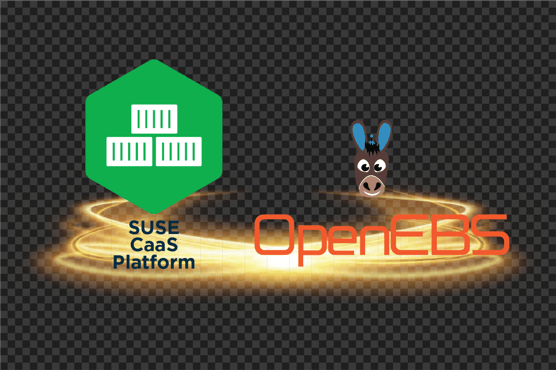Author: Ashok Babu K.G, Senior DevOps consultant at Wipro, works on Works on App Anywhere & cloud-native technologies.
I am recently introduced to OpenEBS, an easy to use persistent storage option for Kubernetes and found it nicely working on the SuSE CaaS platform where I could certify the cloud native databases. In this blog, I cover a few quirks to get it running on the SuSE CaaS platform.
 OpenEBS on SuSE CaaS for persistent storage needs
OpenEBS on SuSE CaaS for persistent storage needsSuSE CaaS Platform is an enterprise-class container management solution that leverage Kubernetes as the orchestration layer and SuSE MicroOS as the host operating system for master and worker nodes.
SuSE CaaS provides enhanced security policies such as predefined pod security policies.
In SuSE MicroOS, a read-only Btrfs file system is used for the root file system with OverlayFS. Sub-volumes for data sharing is read-write.
Outlined below are some of the steps that need to be taken care while installing OpenEBS version 0.8.1 on SuSE CaaS Platform 3
Issue
Default OpenEBS installation would fail on SuSE CaaS platform due to the following restrictions by the platform
- NDM Daemonset fails to spin up as it requires privilege permission
- Sparse pools will not be created as it uses by default /var/openebs directory which is read-only directory under root filesystem in SuSE CaaS.
- Runtasks in operator uses /var/openebs directory for temporary file creation due to this cstor-target pods or cstor-pool pod gets stuck in “ContainerCreating” status
Resolution
Step1
To install OpenEBS on SuSE platform run the following custom yaml file instead of default operator yaml
kubectl apply -f https://openebs.github.io/charts/openebs-operator-susecaas.yaml
This is a customized operator yaml file for SuSE CaaS platform that uses the role suse:caasp:psp:privileged for creating privileged DaemonSet
Step2:
Perform the following changes in the runtask after completing step1
Note: — This step is not required if you are using the openEBS version 0.9 which is the upcoming release.
- Change the path in runtask for cstor-pool-create-putcstorpooldeployment
kubectl edit runtask cstor-pool-create-putcstorpooldeployment-default-0.8.1 -n openebs
Change from
path: /var/openebs/shared-
Change to
path /var/lib/overlay/openebs/shared-
- Change the path in runtask for cstor-volume-create-puttargetdeployment
kubectl edit runtask cstor-volume-create-puttargetdeployment-default-0.8.1 -n openebs
Change from
path: /var/openebs/shared--target
Change to
path: path /var/lib/overlay/openebs/shared--target
Step 3:
Optional: If you need to use sparse pool
kubectl apply -f https://raw.githubusercontent.com/openebs/openebs/5860c0a4619a9feddf5d75d11f50f2ea8fdcec82/k8s/demo/fio/demo-cstor-sparse-pool-limits.yaml
Step 4:
Configuration of storage pool, storage class and PVC are like any other platform and the steps are outlined in https://docs.openebs.io
Pool Configuration — https://docs.openebs.io/docs/next/configurepools.html#manual-mode
Storage class — https://docs.openebs.io/docs/next/configuresc.html#creating-a-new-class
Volume — https://docs.openebs.io/docs/next/provisionvols.html#provision-from-a-disk-pool
Conclusion:
Above approach can be followed to install OpenEBS 0.8 on SuSE CaaS platform 3.0 which needs additional configuration.
With OpenEBS 0.9 it would be simplified such that you would need to only apply the operator yaml to perform the installation.
SUSE CaaS Platform: (Container as a Service Platform) is an integrated software platform which automates the process of building, managing and upgrading of Kubernetes clusters. It combines the benefits of an enterprise-ready operating system with the agility of an orchestration platform for containerized applications. More details — https://www.suse.com/products/caas-platform/
OpenEBS: OpenEBS is the leading open-source project for container-attached and container-native storage on Kubernetes. OpenEBS adopts Container Attached Storage (CAS) approach, where each workload is provided with a dedicated storage controller. OpenEBS implements granular storage policies and isolation that enable users to optimize storage for each specific workload. OpenEBS runs in userspace and does not have any Linux kernel module dependencies. More details — https://openebs.io/
They have a very responsive community. Visit slack.openebs.io
This article was first published on Apr 25, 2019 on OpenEBS's Medium Account





Game changer in Container and Storage Paradigm- MayaData gets acquired by DataCore Software
Don Williams
Don Williams
Managing Ephemeral Storage on Kubernetes with OpenEBS
Kiran Mova
Kiran Mova
Understanding Persistent Volumes and PVCs in Kubernetes & OpenEBS
Murat Karslioglu
Murat Karslioglu